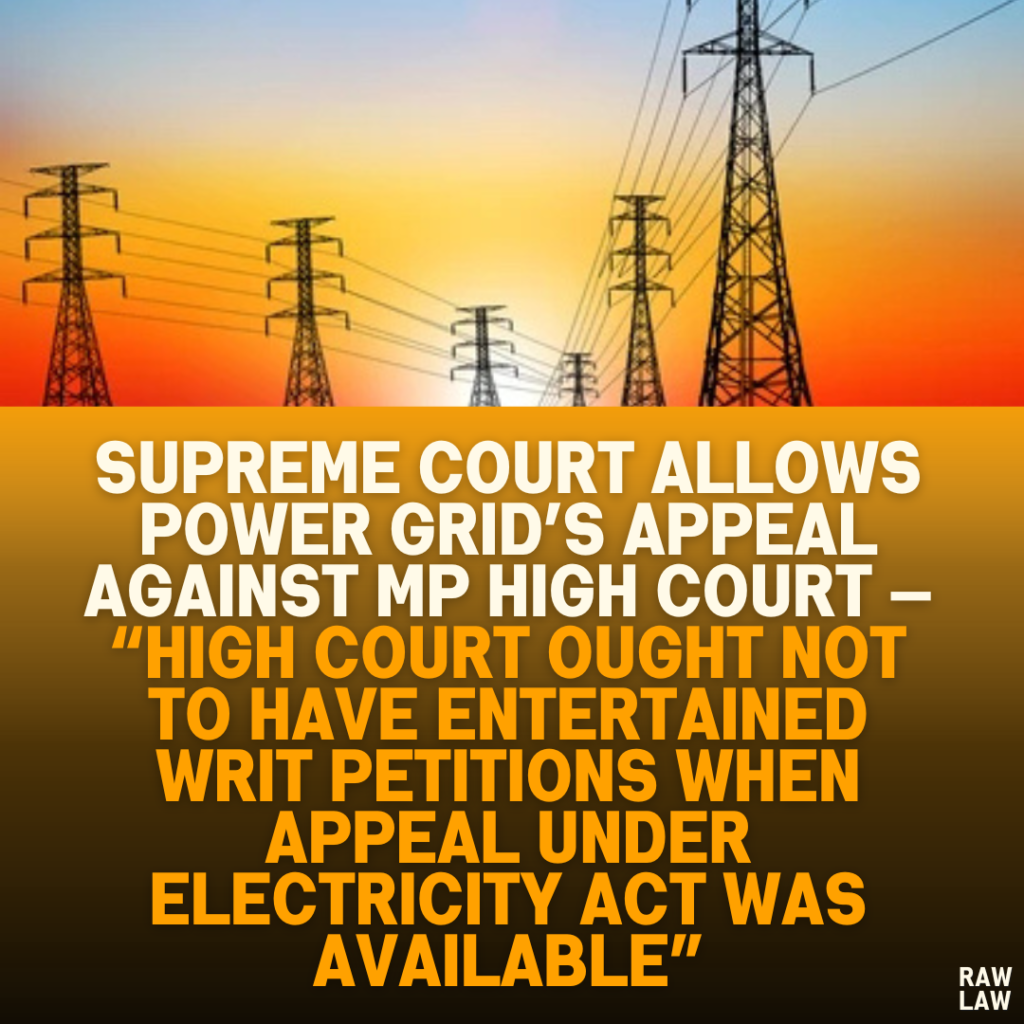Court’s Decision
The Supreme Court allowed the appeals filed by Power Grid Corporation of India Limited challenging the Madhya Pradesh High Court’s decision to entertain writ petitions filed by the Madhya Pradesh Power Transmission Company Limited (MPPTCL) against compensation-related orders of the Central Electricity Regulatory Commission (CERC). The Court held that:
“The CERC, while exercising its regulatory functions under Section 79(1) of the Act, 2003, can pass orders granting compensation even in the absence of specific regulations, and such orders are not beyond jurisdiction.”
It further held that:
“There exists a clear and efficacious statutory remedy of appeal under Section 111 of the Electricity Act, 2003 to the Appellate Tribunal for Electricity (APTEL), and the High Court ought not to have entertained the writ petitions.”
Accordingly, the High Court’s order admitting the writ petitions was set aside.
Facts
Power Grid Corporation (appellant) implemented transmission assets under the Western Region System Strengthening Schemes (WRSS-XIV and WRSS-XVI) at the Indore substation upon request from MPPTCL (respondent), the state transmission utility. However, MPPTCL delayed construction of downstream intra-state transmission lines, causing Power Grid to approach CERC for determination of Commercial Operation Date (COD) and approval of tariff under the 2014 Tariff Regulations.
CERC approved COD but did not condone the delay. It allowed compensation in the form of liquidated damages and incidental expenses from the newly determined COD up to the date before downstream systems were operational. MPPTCL challenged this before the High Court, arguing CERC exceeded its jurisdiction and had no power under the regulations to grant such compensation.
Issues
- Whether the CERC’s grant of compensation for delays was beyond its jurisdiction under the Electricity Act, 2003.
- Whether the High Court was justified in entertaining writ petitions despite the availability of an appellate remedy under Section 111 of the Act.
- Whether such compensation falls under regulatory or adjudicatory functions of CERC under Section 79.
- Whether the orders of CERC breached principles of natural justice or constitutional parameters warranting High Court interference.
Petitioner’s Arguments
- The appeal before the Supreme Court was grounded on the principle that the High Court erred in exercising jurisdiction under Article 226, bypassing the statutory remedy under Section 111 of the Electricity Act.
- Power Grid argued that CERC acted within its jurisdiction under Sections 62 and 79, and the tariff determination (even if involving compensation) is appealable.
- The respondent (MPPTCL) had not challenged the validity of any regulation under Section 178. Hence, their grievance pertained only to interpretation or application of existing regulations, which falls squarely within the domain of APTEL.
- The decision in PTC India Ltd. v. CERC (2010) 4 SCC 603 was relied upon to argue that the regulatory decisions of CERC should be challenged through the appellate mechanism, not by writ.
- The writ petition was an attempt to circumvent APTEL’s precedent in similar cases (e.g., Nuclear Power Corporation).
Respondent’s Arguments
- MPPTCL contended that the CERC acted without jurisdiction in imposing a ₹6.18 crore compensation liability.
- They argued there was no express regulation allowing for such compensation, and hence the order amounted to rewriting the terms of their agreement.
- They relied on the Whirlpool exception to justify writ jurisdiction, arguing the order lacked jurisdiction and violated principles of natural justice.
- MPPTCL argued that since APTEL had taken a contrary view in a similar case, approaching it would be futile.
Analysis of the Law
- The Court noted that Section 79 grants dual powers—regulatory and adjudicatory—to CERC.
- The determination of compensation in this context was held to be a regulatory function under Section 79 and not ultra vires in the absence of specific regulations under Section 178.
- The Court reiterated that regulations under Section 178 are of general application, but Section 79 empowers CERC to take specific measures, even in regulatory gaps.
- Drawing from PTC India and Energy Watchdog v. CERC (2017) 14 SCC 80, it held that the absence of regulation does not bar CERC from acting when vested with statutory regulatory powers.
Precedent Analysis
- PTC India Ltd. v. CERC (2010): Held that CERC can regulate under Section 79 even in the absence of regulations under Section 178.
- Energy Watchdog v. CERC (2017): Clarified the scope of regulatory functions under Section 79.
- Whirlpool Corp. v. Registrar of Trademarks (1998): Laid down exceptions to the rule on alternate remedy.
- AERA v. Delhi Int’l Airport Ltd. (2024): Clarified that regulatory functions may involve individual-specific orders and remain regulatory in nature.
Court’s Reasoning
- The Court disagreed with the High Court’s invocation of the Whirlpool exceptions, holding that the CERC had not acted wholly without jurisdiction.
- There was no breach of natural justice, as MPPTCL was served and had the opportunity to argue its case.
- The respondent’s challenge pertained to the correctness of the decision and not to the vires of any regulation.
- It held that permitting writ petitions in such cases would lead to inconsistent decisions across High Courts and undermine the special appellate framework.
Conclusion
The Supreme Court set aside the High Court’s order admitting the writ petitions, and allowed the appeals filed by Power Grid. It held that:
“There exists a statutory mechanism of appeal under Section 111 of the Electricity Act, 2003 and no grounds existed to bypass such mechanism.”
Implications
- Reinforces that electricity sector disputes involving tariff and compensation must follow the specialized statutory appeal route via APTEL.
- Clarifies that regulatory authorities like CERC have the power to grant compensation in absence of express regulations if acting within their statutory framework.
- Limits the scope of High Courts entertaining writs when expert tribunals have appellate jurisdiction.
